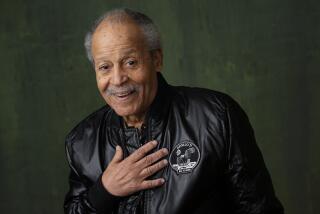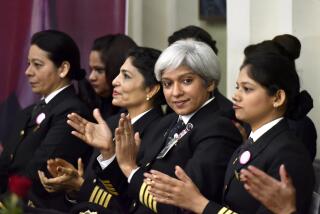After 36 Years, She’s Still Aiming for the Stars
- Share via
Jerrie Cobb may be the most sought-after guest who ever checked into the Motel 6 in Cocoa Beach, Fla.
Peter Jennings, CNN, “Good Morning America” and reporters from the world’s major media have taxed the motel’s phone lines and the message-taking limits of the man at the front desk. It’s the kind of surprise celebrity that Cobb, 67, never planned or asked for, and one she wishes she could live without.
For the record:
12:00 a.m. Nov. 2, 1998 For the Record
Los Angeles Times Monday November 2, 1998 Home Edition Southern California Living Part E Page 3 View Desk 1 inches; 18 words Type of Material: Correction
Misspelled name--The name of NASA Administrator Dan Goldin was misspelled in a story on pilot Gerrie Cobb that ran Thursday.
But as the woman who almost became the first female to fly in space, though has never yet lifted off a launch pad--a woman still trying after 36 years to become an astronaut-- Cobb says she’ll gladly use the publicity generated by a grass-roots group of admirers to get her point across:
She wants to be inside the next space capsule when it launches in February.
And she may finally have a chance. NASA Administrator Dan Golden has said if the agency continues its studies of seniors in space, “there is no one in America more qualified or deserving to be on that space shuttle than Jerrie Cobb.”
“Flying is what I do. It is my gift and my talent. It defines my life,” Cobb said Tuesday, on the phone from Cape Canaveral, where she was getting ready to watch today’s Discovery launch, with 77-year-old John Glenn aboard. “He’s a fellow pilot, a kindred spirit. I’m here to wish him well,” she said.
Cobb, an Oklahoma native, has been flying since she was 16, has won numerous aviation honors and has broken world records for altitude, distance and speed. She tested in the top 2% of all male and female potential astronauts recruited in the early 1960s to form America’s earliest space brigade. But her chances of flight were aborted at congressional hearings in 1962, when male experts--including Glenn--urged that women should not be sent into space.
“The men go off and fight the wars and fly the airplanes and come back and help design and build and test them. The fact that women are not in this field is a fact of our social order,” Glenn said at the time.
Congress decided he was right--that only military test pilots could become U.S. astronauts. Since women were not allowed to become military test pilots in that era, the whole female gender was excluded automatically. (Russia sent its first female into space the following year, 1963; Sally Ride became America’s first female in space 20 years later.)
Cobb, who had excelled during the lengthy and grueling astronaut preparation, was brokenhearted and went off to find another kind of life.
For the last 36 years, she has lived and worked in the most remote part of the Amazon rain forest. When the space program did not work out, she says, she wanted to “go where my flying talents would do the most good.” She set up a nonprofit foundation (“I got $730 in contributions last year”) and works independently as a kind of missionary pilot who flies seeds and medical supplies to some of the world’s most isolated, primitive and starving people.
She has no fixed address, sleeps in a hammock in communal huts and contentedly shares, with these people she has grown to love, a life without benefit of plumbing, electricity, medical care or even mail.
“I can entertain an entire tribe with a flashlight for a week,” she says, “and I get as much joy out of it as they do.”
She was nominated for a Nobel Peace Prize in 1981.
She flies her plane, named Juliet, back to the United States about every six months--and whenever there’s a space mission. Most of her trips are unheralded; on this one, she is becoming famous. With news of Glenn’s return to space, Cobb’s admirers set up a Web site (https://www.jerrie-cobb.org) and started a campaign to give her the chance they feel she deserves as much, if not more, than Glenn does.
Sen. James Inhofe (R.-Okla.), the National Organization for Women and several pilots’ and university women’s organizations have joined in support. Cobb, soft-spoken and shy, is forcing herself to come out of her shell.
“I’d give my life to fly in space. It’s the ultimate fly,” she says. “I’m not leaving until my dream comes true.”
Discovery Launch
More coverage on the return to space in the main news section.
More to Read
Sign up for Essential California
The most important California stories and recommendations in your inbox every morning.
You may occasionally receive promotional content from the Los Angeles Times.













